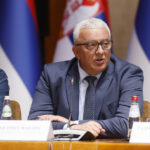- Serbia agrees on free trade, defense cooperation with Egypt
Serbian President Aleksandar Vučić went on a two-day visit to Egypt, leading the government delegation.
This is the first visit of president of Serbia to Egypt in almost 15 years. Earlier, in July 2022, Egyptian President Abdel Fattah al-Sisi paid an official visit to Serbia, which was the first time in three and a half decades when an Egyptian head of state came to the country.
According to Vučić, during the visit, he discussed with the Egyptian president all geopolitical issues and all forms of cooperation, from agriculture to defense.
“What is important is that we agreed on cooperation at the military, military-technical, and military-economic levels, but also in the issue of technology sharing,” the Serbian president told reporters. He said that in the near future, joint training of special units of the Serbian and Egyptian armies will be held in Serbia.
At the political level, according to Vučić, Serbia and Egypt will hold constant consultations on various issues to help each other in international fora, representing similar or identical interests.
During the visit, a number of bilateral agreements and memoranda were signed in various fields, including investment, trade, education, labor, culture, as well as the Agreement on Free Trade between Serbia and Egypt. As noted, thanks to the deal, the trade exchange between the two countries will increase several times.
The president of Serbia also met in Cairo with the secretary general of the League of Arab States.
Vucic announced plans to embark on a larger tour of Africa and Asia scheduled for this fall. According to the agreement with Hungarian Prime Minister Viktor Orban, the two countries will cover 80 to 90 percent of Africa with diplomatic missions, both joint and individual, and will also deploy a joint foreign trade office.
- Montenegro court acquits those accused in coup d’état case
On July 12, the High Court in Podgorica acquitted the persons accused in the case of the “2016 coup d’état”.
Russian citizens Eduard Shishmakov and Vladimit Popov (who were referred to as Russian intelligence agents), leaders of the former pro-Russian Democratic Front, current leaders of the coalition “For the Future of Montenegro”, Speaker of the Montenegrin Parliament Andrija Mandic, MP Milan Knezevic, and ex-Commander of the Serbian Gendarmerie Bratislav Dikic were acquitted by the verdict, as were several other citizens of Serbia and Montenegro.
Members of the group targeted in the case were accused of setting up a criminal organization aiming for the violent seizure of power on the day of the 2016 parliamentary election in order to prevent the country from joining NATO. The culprits allegedly planned to stage riots, seize the parliament building, and kill the then prime minister of the country, Milo Djukanovic.
In the first verdict handed down in this case in 2019, all suspects were found guilty and sentenced to a total of 70 years in prison. The verdict was overturned three years ago in the Court of Appeal and a new trial was ordered.
The new verdict in the old case was issued on July 12, 2024, by a panel of judges headed by Zoran Radovic. “There was no evidence of the defendants’ guilt in the crimes they were charged with, so they were acquitted,” Radovic noted, commenting on the verdict.
The verdict is not final as the special prosecutor’s office is still able to appeal it.
The Democratic Party of Socialists (DPS), which was in power in Montenegro in 2016 and is now in opposition, said Judge Radovic “betrayed the state interests of Montenegro” and “destroyed the legal system” with his verdict. The DPS demands that a parliamentary inquiry be launched into the coup d’état case.
At the same time, the U.S. Embassy in Podgorica emphasized that it is not a final verdict, and noted that it is closely monitoring the situation.
- Probe launched into reports of attempt on Djukanovic
The Police Department of Montenegro said they are opening an investigation in connection with the reports received about the alleged assassination attempt targeting former President of Montenegro, Milo Djukanovic.
It was also decided to strengthen protection measures for Djukanovic as part of prevention efforts.
Recently, several Montenegrin media, citing sources in the security agencies, reported that a regional criminal group was plotting the assassination of Djukanovic, and that the former Montenegrin president had been tipped off by an unnamed intelligence officer.
The news about the preparation of an assassination attempt on Djukanovic was taken very seriously in the region.
The former president of Albania, Ilir Meta, believes that “those who failed the coup d’état project a few years ago, who failed the projects to alter the borders, those who seek to undermine the Euro-Atlantic future of Montenegro and the region stand behind these plans. They are the ones who killed the former pro-European Prime Minister of Serbia, Zoran Djindjic.”
- Montenegrin authorities bann Russian media broadcasting
The ban on the broadcasting of 20 Russian TV channels and multimedia projects came into effect in Montenegro on July 10.
Prohibited channels include RT in several language versions and Sputnik. “The decision of the government of Montenegro provides for a ban on broadcasting or enabling, facilitating or otherwise participating in the distribution of the content of the mentioned channels both on television and across the Internet,” the authorities said in a statement.
The Government of Montenegro made this decision in accordance with “international restrictive measures” adopted by the Council of the European Union “in connection with Russia’s actions in Ukraine.” Although the Montenegrin authorities formally decided to introduce sanctions against Russian media earlier, it is only now that these restrictions are practically introduced.
“Montenegro’s step is nothing more than a hostile act of censorship,” said the spokeswoman for the Ministry of Foreign Affairs of the Russian Federation, Maria Zakharova, stressing: “Moscow will react asymmetrically.”
- Serbia reviving lithium mining project
The Constitutional Court of Serbia overturned the Serbian government’s decision to stop the Jadar project, which involves lithium ore mining in western Serbia. The court concluded that the government’s decision “does not comply with the Constitution and law.”
The ruling was handed down at a session in Belgrade on July 11, despite protests from local residents and environmental activists.
More than two years ago, the Serbian government, led at the time by Ana Brnabić, halted the project amid mass protests and revoked the licenses of Australian mining giant Rio Tinto. However, on June 22, 2024, Brnabić stated that it would be “abnormal” if Serbia abandoned lithium mining.
Rio Tinto intends to open a lithium mine in the Jadar River Valley in western Serbia.
Regional media claim that the restoration of the project is taking place with the EU support.
- Beleri, imprisoned for voter bribery, participates in EP’s inaugural session
MEP Fredi Beleri, the ethnic Greek elected Mayor of the Albanian town of Himara, who is currently serving time in prison for voter bribery, has been temporarily released from prison to attend the inaugural session of the European Parliament in Strasbourg.
Beleri, a member of Albania’s ethnic Greek community, was elected Mayor of Himara in May 2023 before being arrested and jailed as the court found him guilty of buying votes.
A month after his imprisonment, he was elected to the European Parliament as member of Greece’s ruling New Democracy party led by Greek Prime Minister Kyriakos Mitsotakis.
The Albanian government has now granted Beleri a temporary reprieve so he can officially take his seat in the European Parliament and take part in the inaugural session. However, Beleri shall return to prison by July 20 to serve the remainder of his two-year sentence.
Beleri’s trip to the inaugural session of the European Parliament, with the obligation to return to prison, demonstrates that Tirana, on the one hand, does not want any escalation of the already sensitive situation around the representative of the Greek minority, but, on the other hand, is not going to go for rapprochement with Athens by revoking a guilty verdict. This means that Albania will continue to experience complications on its path to joining the EU due to Greece’s stance on the Beleri case.



